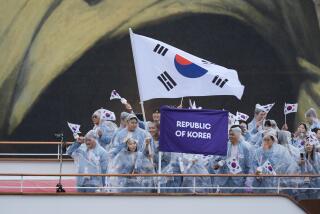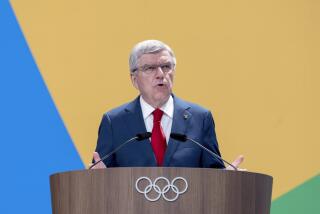An Olympic Partnership That May Never Work : IOC Official Has Doubts About North Korea’s Involvement With 1988 Games
- Share via
RALEIGH, N.C. — Richard Pound, an International Olympic Committee vice president, said late Friday night he is hopeful but not optimistic a compromise can be reached that would enable some events in the 1988 Olympic Games to be held in North Korea.
He also said he has increasing doubts about whether the North Koreans are sincere in their demands to share the Games, which were awarded in 1981 to Seoul, South Korea.
“There’s every chance South Korea could win several gold medals in archery,” said Pound, referring to one sport that has been offered to North Korea.
“Then the South Korean flag would go up over North Korea, and the anthem would be played. For the North Koreans, that’s unthinkable.”
Pound, a Montreal attorney, made his comments after arriving from IOC headquarters in Lausanne, Switzerland, where the fourth round of negotiations between South Korea and North Korea ended Wednesday. He was here to attend the U.S. Olympic Festival’s opening ceremony Friday at Carter-Finley Stadium, where one of the regional teams marched behind a banner that said, “Ollie’s North.”
Whoever said sports and politics don’t mix hasn’t been paying attention.
Since negotiations began with the North Koreans in 1985, the IOC’s official stance has been that peace is at hand. But Pound is the first high-ranking IOC official to express doubt that it can be achieved.
In the latest talks, the IOC offered a fifth sport, women’s volleyball, and proposed that the entire 100-kilometer team cycling race be held in North Korea.
Earlier, the North Koreans were offered archery, table tennis, a portion of the soccer tournament and one leg of the cycling race, which would have begun in North Korea, crossed the demilitarized zone and ended in South Korea.
But Pound said the North Koreans have continued to insist upon holding 8 of the 23 sports, including the entire soccer tournament.
In addition, Pound said the North Koreans have demanded the designation as co-hosts of the Games, a name change from the Seoul Olympics to the Pyongyang-Seoul Olympics, their own organizing committee and one-third of the television revenues.
“We’ve said we’re not interested in negotiating any of the side issues until they accept the sports we’ve offered them,” Pound said.
Pound termed negotiations with the North Koreans “very difficult.”
“They seemed to be encouraged when they left Lausanne,” he said. “They said we are proceeding step by step to eight sports. We told them they didn’t understand, that this is our final offer. They said we told them the last offer was the final one.”
While there is no deadline for an agreement, Pound said it would be difficult to move events to North Korea after Sept. 17, one year before the opening ceremony is scheduled for Seoul. He said the South Koreans are resistant to making changes after that date, as are the national Olympic committees, the international sports federations and the television networks.
Pound also said he believes North Korea’s intransigence is an “embarrassment to their friends” and doubts there will be a boycott by other socialist countries because of the issue.
“North Korea has some vocal support,” he said. “The Soviets, East Germans and Chinese have told us it would be helpful to them and perhaps would decrease tension on the Korean peninsula if we can give something to the North.
“But they’ve also said that what we’ve done so far has made it possible for them to accept invitations to the Olympics. They say they’ll be in Seoul regardless of the North Koreans. That’s the word we’ve received from literally the highest levels.”
Pound said the offer to North Korea is a violation of the Olympic Charter, which awards the Games to a single city. But there have been precedents for moving certain events, notably during the 1956 Melbourne Olympics, when the equestrian competition was held in Sweden because of a horse quarantine in Australia.
“What we’ve done internally is have the entire IOC membership authorize the executive board to make whatever agreements seem best,” he said.
“This is a chance for sports to do something politics hasn’t been able to do, bring South Korea and North Korea together.”
More to Read
Go beyond the scoreboard
Get the latest on L.A.'s teams in the daily Sports Report newsletter.
You may occasionally receive promotional content from the Los Angeles Times.






